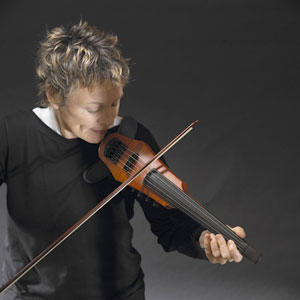Delusion: cutting edge some time ago

Laurie Anderson's Delusion isn't a theatre piece per say and it's not quite a concert. This will probably result in confusion for anyone going to the Vancouver Playhouse and expecting to see a play. You will be left scratching your head asking yourself "What exactly am I watching?". What you are watching (or not depending on your tolerance for this sort of thing) is a mash-up of experimental rock, spoken word story telling, performance art, and giant projections presented under the moniker of performance art. This sounds a lot cooler than it is and unfortunately the Playhouse is a far too formal venue for this show.
A giant loft space or warehouse would have been a better fit given the high art pretensions of Delusion. Having said that, kudos to the Playhouse for at least trying to stretch their subscriber basis and challenge Vancouver audiences with this "experimental" new work, which is part of the 2010 Cultural Olympiad. Unfortunately, the show has a dated feel as though it would have been all the rage 15 years ago in an avant-guard corner of Manhattan. The music and visual techniques explored here are fairly common place nowadays (thanks, in part, to performers like Anderson paving the way) and what we're left with is a meandering multimedia piece for the artists of yesteryear.
The show consists mostly of Laurie Anderson standing just off-centre playing her violin while programming loops and strange sound effects. She is supported by two other musicians to her immediate left and right, who are mostly hidden behind projection screens. A third projection screen looms in the background effectively covering the rear wall of the stage. Visual images abound as the group plays post-rock, noise-rock, and experimental grooves that sound like a drug inspired infusion of The Mars Volta, God Speed You Black Emperor, Bjork, and Angelo Badalamante. Between "songs", Anderson stands in front of her key board, speaking through a vocal distortion effect, which gives her a deep male robot voice, and waxes poetic about contemporary society. Issues such as space travel, corporate hegemony, and the American wasteland dominate this part of the show. All the while she underscores herself with soundscapes that seem to be lifted from Twin Peaks or an 80's sci-fi B-movie. This is followed by another "song", supported by some truly fantastic projections of hand drawn houses, people, and words. And then it's storytelling time. Anderson sits center stage and offers spoken word passages ruminating on dreams, spirituality, superstitions, culture, and ancestry. And so Delusion goes: alternating between musical passages and monologues for an hour and a half.
Unfortunately, Delusion is not the sum of it's parts. The few outstanding passages aren't enough to buoy the mostly languid musical passages. At times the thumping electro-beat and wall of noise orchestra combined with the visually stunning projections is entrancing, creating a hazy meditative state. And, indeed, this is when Delusion is at it's most effective. There are moments when, hot of the heels of hypnotizing the audience with potent imagery and softening us with clever word play, Anderson launches into some virtuoso violin playing and we're bombarded with images of whirling leaves and chaotic animation. But it's nearly impossible to sustain this for 90-minutes and the wash-rinse-repeat structure of Delusion ends up wearing thin after the first hour.
The straight forward monologues were the highlight and are fantastic in their simplicity and content. One particular passage, a dream diary of sorts, is by turns evocative, disturbing, and hilarious. In fact, the show would collapse under the weight of it's own pretentiousness were it not for Anderson's sense of humour, clever one-liners, and comedic timing. The spectacular projections, while gorgeous to look at, aren't enough to distract from the fact that there are bands who play this sort of music with more variation and do it a lot better.
Delusion By Laurie Anderson. Commissioned by the Vancouver 2010 Cultural Olympiad and the Barbican Centre, London. It ran at the Vancouver Playhouse February 17-21. For more information go here.



